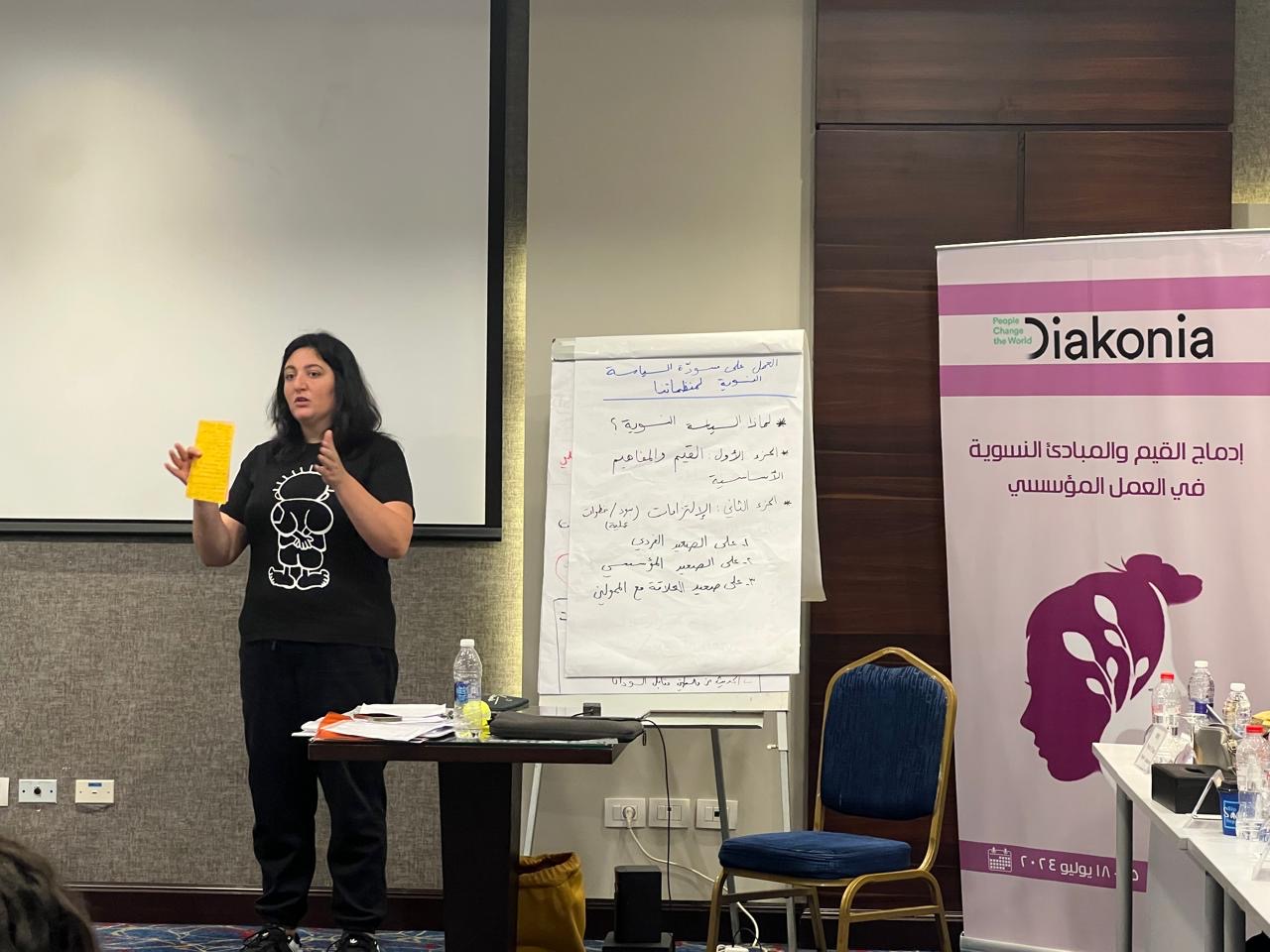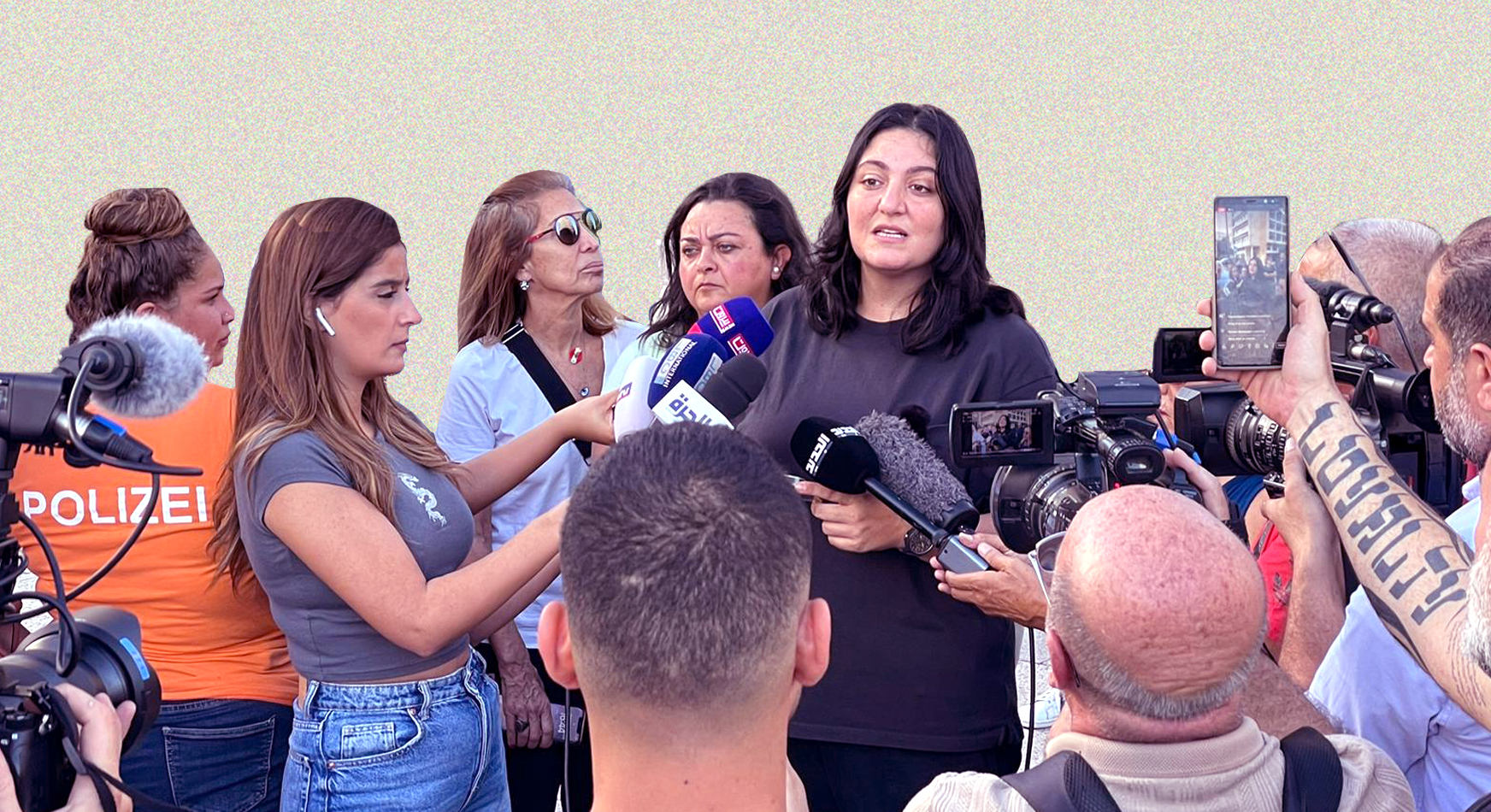A group of independent activists and journalists carried out a movement in front of the Palace of Justice in Beirut, in the wake of summoning the editor-in-chief of “Sharika Wa Laken” platform, Hayat Mirshad, to appear before the Cybercrimes Bureau.
Earlier, The Alternative Press Syndicate had called for action to protest the obstinate refusal of the Appellate Public Prosecutor in Beirut, Judge Zaher Hmedeh, to refer the case of journalist Hayat Mirshad to the specialized judicial authorities. In addition, the Public Prosecutor of Cassation, Ghassan Oweidat, shirked his responsibility of issuing a circular to the Public Prosecution to refer press cases to the specialized judiciary.
Article 29 of the Publications Law stipulates that “no security entity or system shall have the authority to investigate a journalist who proposes his affiliation with the Editors’ Syndicate or proves that what he published was part of his or her journalistic work. If the case requires an investigation, the investigating judge must conduct it before referring the case to the Publications Court within a period not exceeding five days.”
Is the judiciary practicing Selective enforcement?
Raising the slogan, “We will not comply with the summons”, the protesters denounced the policy of muzzling voices pursued by the judicial police by subpoenaing journalists in publishing and publications cases.
They chanted slogans affirming opposition to this policy of intimidation, by continuing to expose male attacks. They stressed the importance of the press’s commitment to raising the voice of survivors and supporting them. Among these chants are “Feminists, Feminists, we raise the voice of survivors”, and “O judiciary are you practicing selective enforcement on the press and female activists?”.
In a procedure that constitutes a flagrant violation of journalists’ rights, Judge Zaher Hmedeh insists on summoning colleague Hayat Mirshad to appear before the Cybercrimes Bureau. This happens despite Hayat’s presenting her membership card in the Lebanese Press Editors Syndicate, and proving that the lawsuit is related to her journalistic work.
What is alarming is Judge Hmedeh’s failure to respond to the request of Hayat Mirshad’s legal representative, lawyer Farouk al-Mughrabi, to retract the reference and comply with the provisions of the Publications Law.
Hayat Mirshad: “A systematic campaign against freedoms”
For her part, colleague Hayat Mirshad denounced “the judicial and security pressure and intimidation faced by journalists in Lebanon while carrying out their obvious work to advocate for women’s issues and raise the voice of survivors.”
She criticized “the failure of the judiciary to decide on previous cases of men accused of harassment.” “Instead of regarding the testimonies of survivors as a formal denunciation and taking action to protect them, the judiciary is now winning over for a suspect of sexual and physical assault by subpoenaing journalists who expose these practices and crimes,” she said.
She pointed to “the increase in murders of women and girls, and the domestic and sexual violence committed against them at a terrifying pace, amid the judicial and security slackness in cases of violence against them.”
“Refusing to comply with injustice and violating legal texts,” Mirshad emphasized that “Judge Hmedeh’s action is a continuation of the systematic crackdown on public freedoms in Lebanon,”.
We believe survivors, no matter the attempts to suppress and silence journalists
She also stressed that “there will be no retreat from the battle of protecting the rights of journalists by all available means of protest and pressure.”
She reiterated “the principle of validating survivors, no matter the attempts to suppress and silence journalists.” She praised “the role of the press in amplifying the voices of these survivors until justice is served for them in the light of the daily danger that lurks around women and the feminist movement in Lebanon, and with the increasing security and legal prosecutions.”
Elsie Moufarrej: “We will not sign any pledge“
Elsie Moufarrej, the coordinator of the Alternative Press Syndicate, sent a letter to the judiciary insisting on “not waiving the legally guaranteed right of journalists.”
She stressed their legal right to “limit the investigation of their cases to the specialized authorities: either the investigating judge or the Publications Court.”
She pointed to “the intimidating approaches and pressure journalists and activists are subjected to by the security entities and systems, such as forcing them to sign pledges.”
“We will not sign any pledge. We are committed to our rights; we will continue to write and expose corruption and criminals.”
“It is not surprising that under this system, which perpetuates a policy of impunity, those who expose crimes are prosecuted and criminals are left free,” she said.
“Feminist Civil Society” platform: We refuse to underestimate women’s issues by restricting independent journalism
For its part, the “Feminist Civil Society” platform refused to underestimate women’s issues by restricting independent journalism. It explained that the case of Mirshad “comes in the context of a series of measures that have perpetuated an ascending tendency among the authorities to circumvent freedom of expression and the media.”
She explained that this circumscription “was seen through summoning journalists to security systems, and trying to silence lawyers and prevent them from making public announcements on cases without obtaining prior permission from the Bar Association.”
The feminist platform expressed its solidarity with Hayat Mirshad, saying that her case “is categorized as an attempt to marginalize women’s rightful issues by flogging the platforms that try to highlight them. This is done by establishing a patriarchal system that holds victims and survivors responsible for proving the assaults and harassment they are subjected to.”
She expressed her concern that “the judiciary ignored more than 18 testimonies from survivors, including minors, and did not take judicial action with the suspected attackers while exerting pressure on those who shed light on these cases.”
“How do we protect women from sexual harassment and assault crimes under the dominion of a judiciary that summons journalists because they highlight these abuses while leaving suspects free? “, she asked.
The platform insists that “issues of public freedoms and press freedom are an essential part of women’s battle in Lebanon. What happened with Mirshad is one of the episodes of systematic repression that has recently increased in Lebanon, since there can be no justice for women and no equality without having free voices and independent media that tackle their issues.”
The background of the case… Supporting and advocating for survivors of Joe Kodeih’s harassment
On May 11th, Judge Zaher Hmedeh referred the editor-in-chief of the “Sharika Wa Laken” platform, journalist and feminist activist Hayat Mirshad, for investigation at the Cybercrime Bureau. This was in response to a “libel and slander” lawsuit filed against her by theater director Joe Kodeih, where Hmedeh refused to proceed with the lawsuit before the Publications Court.
This came in the wake of demands launched by “Sharika wa Laken” last April, to boycott a play written and directed by Kodeih, which was to be shown at Monot Theater. The calls were an expression of solidarity with 18 women and girls, including minor students.
In 2020, survivors’ testimonies came to light, accusing Joe Kodeih of repeated harassment.








Leave A Comment